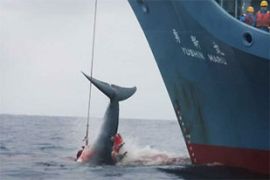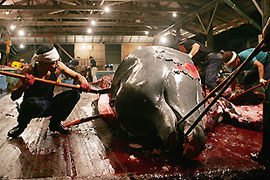Whaling war looms off Antarctica
Conservationists and Japanese whalers brace for clashes in Southern Ocean.

Published On 16 Jan 2007
Under international whaling rules, Japan is allowed to take a certain number of whales each year for research purposes.
Paul Watson, the founder and president of Sea Shepherd, has said he and his crew were ready for extreme measures to disrupt the whaling fleet.
Speaking to the Melbourne-based newspaper The Age, last week he said he was “prepared to die” if necessary to protect the whales.
Watson said the ship-borne hydraulic ram, described as a “hydraulic can opener”, had the potential to damage but not endanger the hull of Japanese whalers, forcing them to abandon the hunt.
But Sea Shepherd’s tactics have been condemned by the head of the Japan Whaling Association who has said that Watson and his crew would be “risking everything” if they carried out their threat to attack the Japanese ships.
“Sea Shepherd has many times rammed and sunk vessels before,” Keiichi Nakajima said.
“There are serious concerns over the safety of the Japanese crew and researchers in the Antarctic when Sea Shepherd is present.”
Ports closed
 |
| Japan says whaling is an integral tradition for many coastal communities[GALLO/GETTY] |
Sea Shepherd’s flagship, the Farley Mowat, is to be joined by a fast pursuit vessel to confront the whaling fleet.
Another ship from Greenpeace is due to arrive in the Ross sea area early in February and is also expected to try and block the hunt.
Australia’s environment minister meanwhile has said that Japanese whaling ships remain banned from docking in Australian ports.
“They can only do that with my permission and I will not grant permission to Japanese whaling vessels or support vessels to use Australian ports,” Ian Cambell told Australia’s ABC radio on Monday.
Cambell also called on Japanese whaling crews to exercise restraint, saying confrontations on previous whale hunts had put lives at risk.
Endangered
The Japanese whalers plan to kill up to 935 Antarctic minke whales and 10 endangered finback whales during the hunt.
Under the rules of the International Whaling Commission Japan is allowed to hunt a limited number of whales for research into the size of whale populations and their habits.
Japan says the sale of whale meat helps to pay for the research programme.
However, conservationists dismiss that argument, saying there is nothing to be learnt by killing the whales.
They say Japanese politicians allow the hunt to go ahead under pressure from a small minority who say that whaling is part of Japanese culture and tradition.
Source: News Agencies